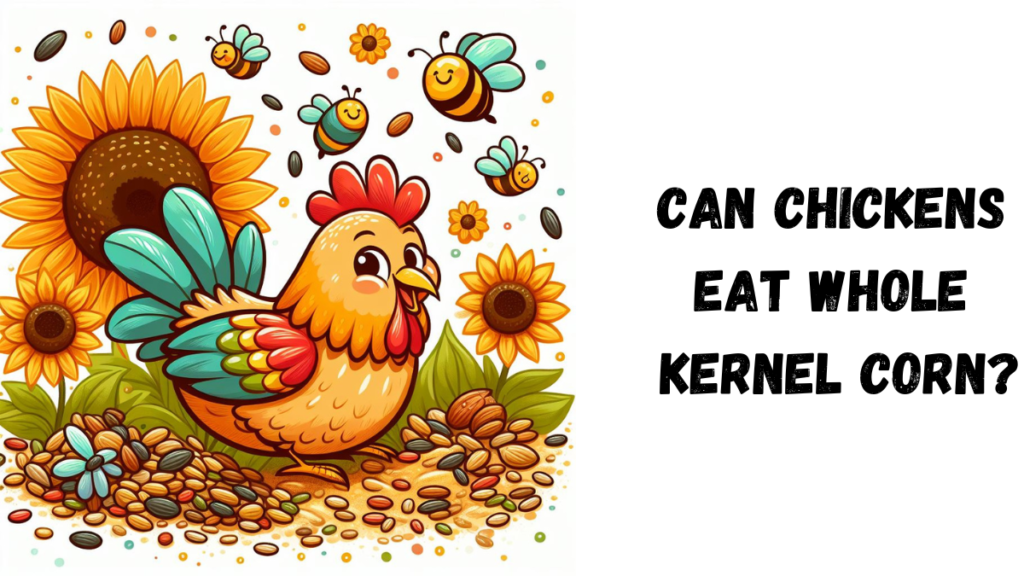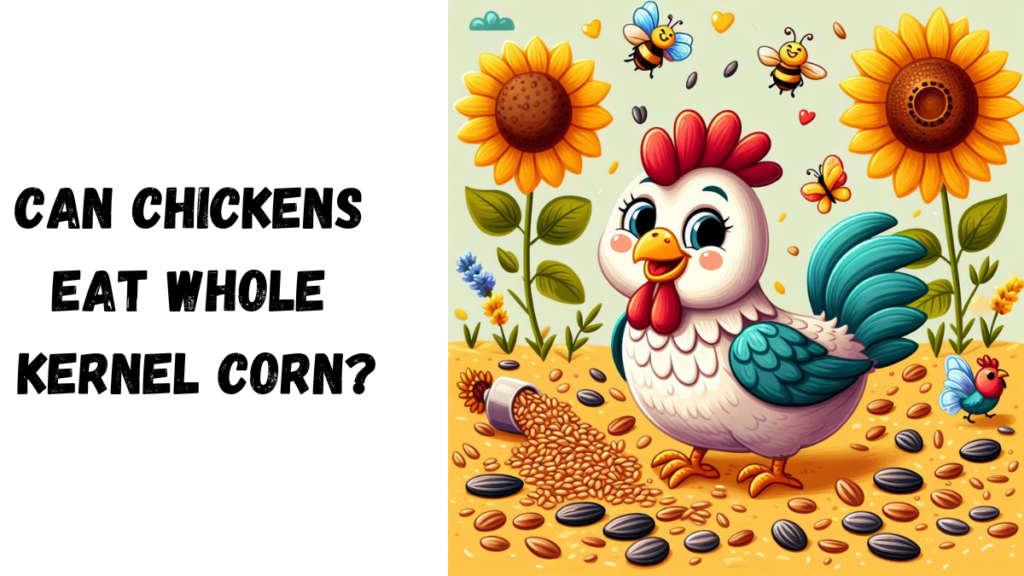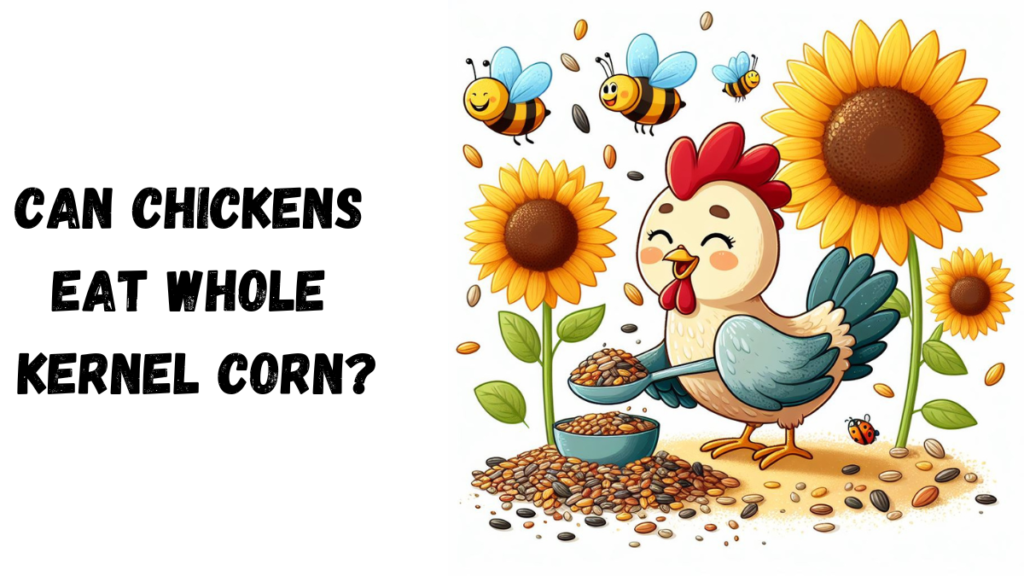Can Chickens Eat Whole Kernel Corn: When it comes to animal feeding, particularly livestock and poultry, the question of dietary suitability is paramount. It is not simply a matter of what chickens can eat, but understanding the nutritional balance that leads to healthy, productive birds.
In this comprehensive exploration, we’ll discuss the feeding preferences of our feathered friends, focusing on an all-time farm favorite: whole kernel corn.
Let’s find the answer, “Can Chickens Eat Whole Kernel Corn?“
Find the best food for your chickens

Table of Contents
The Poultry Pantry: Can Chickens Eat Whole Kernel Corn?
The domesticated chicken, descended from the red junglefowl, isn’t fussy when it comes to food—nearly omnivorous, they’ll peck at a wide variety of items. Commercial feeds, grit, and a steady supply of clean water form the usual basis of a chicken’s diet, supplemented with scratch, vegetable scraps, fruits, insects, and occasionally, kitchen scraps. But where does corn fit into the pecking order?
Corn in the Chicken Diet: An In-Depth Look
Whole kernel corn as part of a chicken’s diet is nothing new. It provides a hearty energy boost thanks to its high carbohydrate content, which is important for birds through cold winter months. But while it’s a widely recognized and accepted source of nutrition for poultry, we must consider the less-obvious factors of corn consumption.
Nutritional Analysis
Corn is rich in calories but doesn’t score as highly in the protein department. This is a crucial distinction, as growing chicks or egg-laying hens require significant protein for muscle development and egg production, respectively.
Fiber Content and Digestibility
High in fiber, whole kernel corn also supports the digestive system, keeping things regular, which is a plus. Chickens will often eat the whole kernel, but it can pass through in the same state, potentially posing a choking hazard for greedy eaters.

The Good and Bad of Corn in the Coop
Corn’s pros and cons reveal themselves when you dig a little deeper. For instance, corn can be a cost-effective way to keep your laying hens in good condition during the warmer months when they’re free-ranging and supplementing their diet with more protein-rich bugs and plants. However, during the winter, a diet too heavy on corn could lead to malnourishment, specifically in younger birds or those whose primary calorie intake isn’t supplemented with proper nutrients.
Pros:
- Cost-effective energy source
- Encourages foraging behavior
- Can be used as a treat to help in training and behavioral enrichment
Cons:
- High-carb/low-protein ratio
- Digestive hazards if not adequately chewed
- Imbalance when overfed, particularly with free range birds or chickens not receiving balanced commercial feed
Best Practices for Feeding Chickens Corn
If you intend to use whole kernel corn as a significant part of your chickens’ diet, moderation and balance are key principles. Here are a few best practices to ensure that whole kernel corn adds to your chickens’ well-being rather than detracts from it:
Balance is Key
Ensure that you’re feeding a balanced diet, taking into account the nutritional needs of the specific flock. This means understanding the protein, carbohydrate, fat, vitamin, and mineral requirements for different stages and types of chickens.
Know Your Flock
Closely monitor your flock’s weight, egg production, and the overall appearance of health. If there are changes, it may be a sign of an imbalanced diet.
Preparation and Safety
To avoid digestive upset, consider slightly grinding the corn, mixing it with other feeds, or cooking it occasionally for added digestibility. Always provide grit to help with digestion.
Seasonal Adjustments
Adjust feeding according to the season and the level of free-ranging. During more active foraging times, corn can serve as an occasional treat. However, in months with a scarcity of nutritional forage, concentrated feed may need to be adjusted for added nutrients.
Alternative Feeding Options
If you’re concerned about the potential issues of whole kernel corn, or if you’re looking to diversify your flock’s diet, there are several alternatives you can consider:
Commercial Poultry Feeds
Formulated to meet the nutritional needs of different classifications of chickens, these feeds are a reliable and convenient option.
Kitchen and Garden Waste
Scraps from a garden, prepared kitchen leftovers, and non-toxic fruit can benefit chickens by offering a range of nutrients.
Omega-3 Supplements
For those interested in enriching their eggs with Omega-3 fatty acids, consider flax seeds or fish oil as part of the diet.

A Balanced Conclusion
The simple answer to the question, “Can chickens eat whole kernel corn?” is a resounding yes. However, the conditions under which they eat it are crucial. Understanding the balance of a chicken’s diet, and the importance of providing a variety of nutrients, is the feather in your cap as a conscientious chicken keeper.
Ensuring the Health and Happiness of Your Flock
Feeding your chickens is not just about filling their bellies—it’s about nurturing them to be the healthiest and happiest birds they can be. Whether you choose to include whole kernel corn in your feeding regimen is a matter of understanding its role, and using it alongside other dietary components. Respect the individual nutritional needs of your birds, and strive for a harmony in their diet that matches the harmony they bring to your farm.
In a world where many are increasingly disconnected from the sources of their food, those who choose to raise chickens have an opportunity to engage with the natural world in a meaningful way. It is in respecting the dietary needs of our chickens, and ensuring they are met with wholesome, balanced feeds, that we contribute to their well-being and in turn, benefit from their invaluable service as egg providers, pest controllers, and, for some, beloved pets.
Interested in learning more about poultry nutrition, sustainable living with chickens, or other fun and educational poultry-related topics? Be sure to stay cluck-cluck-clued-in with our future posts!
Hope, now it’s clear to you “Can Chickens Eat Whole Kernel Corn?”
Frequently Asked Questions (FAQ) – Can Chickens Eat Whole Kernel Corn?
Can I feed my chickens corn year-round?
Yes, you can feed your chickens corn year-round, but it should be as part of a balanced diet, especially in colder months when their nutritional needs change. Corn should be an energy supplement, not the sole component of their diet.
How much corn should I feed my chickens?
The amount of corn to feed your chickens depends on their overall diet and nutritional needs. Corn is best used as a treat or supplement, making up no more than 10% of the chicken’s total dietary intake.
Is it necessary to grind the corn before feeding it to chickens?
Grinding the corn can make it easier for chickens to digest and can help prevent the risk of choking on whole kernels. However, it is not strictly necessary if you are providing adequate grit to aid in digestion.
Can corn affect egg production in chickens?
A diet too heavy in corn, which is low in protein, can negatively affect egg production as chickens require sufficient protein to lay eggs. Balancing corn with higher protein feed is essential.
Will feeding corn to my chickens make them overweight?
Like any high-calorie food, feeding too much corn can lead to overweight chickens if their diet is not properly balanced with exercise and other nutrients. Moderation is key.
Can baby chicks eat corn?
Baby chicks can have difficulty digesting whole kernel corn and it does not provide the necessary nutrients for their growth. It’s best to provide a starter feed formulated for chicks and introduce corn in a ground form as a minor part of their diet as they grow older.
Are there any chickens that should not eat corn?
Chickens with specific health issues, dietary restrictions, or those who are overweight may need to have corn limited or removed from their diet. Always consult with a poultry nutritionist or veterinarian for birds with special dietary needs.
Can chickens eat corn on the cob?
Yes, chickens can eat corn on the cob. It encourages natural foraging behaviors and provides entertainment. Monitor to ensure they are not eating too quickly and risking choking, and always provide grit to aid in digestion.
For more detailed guidance on feeding and caring for your chickens, consult with a poultry care specialist or veterinarian. Your chickens’ health and diet are crucial to their well-being and productivity as part of your homestead or backyard flock.
